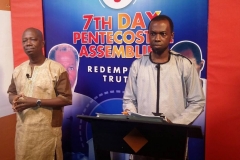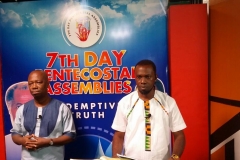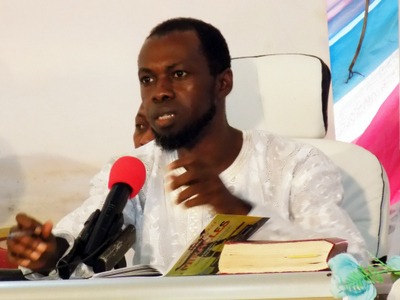Overcoming the Defeated Enemy
By Elder Enoch Ofori Jnr
(Sabbath, Sept. 3, 2011)
Believers have a legacy of enmity and victory in Amalek. Amalek is the defeated enemy we must continually overcome. But somebody will ask, ‘why flog a dead dog?’ It’s because of a vow God has sworn and what Amalek represents.
But hey, rejoice! The enemy is not standing on his feet lunging at you, he lies bruised at your feet, and all you are required to do is to keep him down–in his state of defeat!
In proclaiming an oracle against Amalek, Balaam, the soothsayer hired by Balak, king of Moab in his unsuccessful attempt to curse Israel, said, “Amalek was the first of the nations; but his latter end shall be that he perish for ever” (Nu. 24:20).
By “first of the nations”, Balaam meant Amalek was the first nation to fight Israel. This is the war recorded in Ex. 17:8-16. In this unprovoked aggression, Israel had just left Egypt by the strong arm of the LORD. A nation basically made up of defenceless ex-slaves, Israel was an infant nation hardly able to stand on its own two feet. Yet Amalek was inconsiderate and sprung a surprise attack on Israel from the rear, taking delight in taking pot-shots at the weakest among them (Ex. 17:8; Deut. 25:17-18). It was a war meant to reverse whatever deliverance God had wrought for Israel and nip in the bud His plans to make them His “treasured possession among all nations”, even “a holy nation and a kingdom of priests” (Ex. 19:5-6).
This is where the spiritual significance of the war lies: “The contest of Amalek” was intended “not so much against Israel simply as a nation, as against Israel in their character as the people of God. It was the first attack of the kingdoms of this world upon the kingdom of God, and as such it is typical of all that have followed” (Alfred Edersheim, Bible History Old Testament, p.199).
For the first time in Israel’s salvation history, however, this was a war in which God would let Israel confront the enemy herself with Him in the background. So Moses said to Joshua:
“‘Choose us out men, and go out, fight with Amalek: tomorrow I will stand on the top of the hill with the rod of God in mine hand.
“So Joshua did as Moses had said to him, and fought with Amalek: and Moses, Aaron, and Hur went up to the top of the hill.
“And it came to pass, when Moses held up his hand, that Israel prevailed: and when he let down his hand, Amalek prevailed.
“But Moses’ hands were heavy; and they took a stone, and put it under him, and he sat thereon; and Aaron and Hur stayed up his hands, the one on the one side, and the other on the other side; and his hands were steady until the going down of the sun.
“And Joshua discomfited Amalek and his people with the edge of the sword.
“And the LORD said unto Moses, Write this for a memorial in a book, and rehearse it in the ears of Joshua: for I will utterly put out the remembrance of Amalek from under heaven.
“And Moses built an altar, and called the name of it Jehovah-nissi:
“For he said, Because the LORD hath sworn that the LORD will have war with Amalek from generation to generation” (Ex. 17:9-16).
“Yahweh is My Banner”
A perpetual war has been declared, and that to be fought in every generation under Yahweh’s victory banner! That presupposes that, for us to be victorious in our generation, the strategy of victory used by Moses and the Israelites against Amalek should be adopted by us. Their strategy provides us with the ingredients for victory, while Amalek sets the pattern for all subsequent wars of the enemy against God’s people.
We note several benchmarks:
First, the enemy is the aggressor, the villain: “Then came Amalek, and fought with Israel in Rephidim” (Ex. 17:8). In response Israel does not beat a retreat but fights him.
As the children of God, we should expect war–unprovoked aggression just because we have been saved by God. And the response is not to take cover; we must fight the enemy, our cause is just. James 4:7 says, “Resist the devil, and he will flee from you” . But not in our own power. Moses took the rod of God and instructed Joshua to head for the battlefield.
The “rod” represents the power of God with which Moses performed “signs” and wonders in Egypt (Ex. 4:17), parted the Red Sea and produced water from the Rock. The “rod of God” is a living proven power!
In our spiritual battles with the enemy, we should never forget the power of God–the power we have known to be a miracle performer and victory giver! Rather than fretting about, we should have the presence of mind to invoke the power of God.
The power is roused by prayer: “Let God arise, let His enemies be scattered: let them also that hate Him flee before Him” (Ps 68:1). As King Asa faced “an army of a million men”, he led Judah to pray: ” LORD, it is nothing with Thee to help, whether with many, or with them that have no power: help us, O LORD our God; for we rest on Thee, and in Thy name we go against this multitude. O LORD, Thou art our God; let not man prevail against Thee” (2 Chron. 14:9-11).
Moses’ upraised hand with the rod in his grasp was a prayer gesture. It was the spiritual banner under which Israel fought. As Edersheim notes, “This rod represented the wonder-working Presence of Jehovah with His people as their Shepherd, their Ruler and their Leader. Yet in the fight which Israel was waged, it was not enough simply to stretch forth the rod as over the Red Sea. The hand that holds the rod must also be lifted up to heaven–the faith that holds the symbol of God’s wonder-working presence must rise up to heaven and draw down in prayer the pledged blessing, to give success to Israel’s efforts, and ensure victory to their arms” (ibid. p. 199).
Prayer is the believer’s formidable weapon in his spiritual arsenal. It’s by prayer that we take up “the sword of the Spirit” which is “the Word of God” with which we fight and rout the unseen forces of darkness (Eph. 6:12-13, 17-18).
But the “rod” must not be held aloft by one person or he will grow weary, and that will work to the advantage of the enemy. Aaron and Hur must hold up the hands of Moses until the battle is won at the going down of the sun!
As in the case of Israel, the enemy fights not an individual but God’s people as a body. For sustained, effective prayers, we must pray as a team like the early church (Acts 2:42, 4:23-31, 13:1-2; cp Joel 2:16-19).
As an individual believer don’t think to fight the devil as a’ lone ranger’; rally the prayers of the brethren behind you, just as scripture exhorts: “pray for one another” (Jam. 5:16; cp Eph. 6:19). There’s real power in the corporate prayer of the saints. It keeps the individual believer both strengthened by the faith of fellow brethren and sends a powerful petition to God. In Matt. 18:19 the Lord Jesus says: “Again I say to you that if two of you shall agree on earth as regarding anything that they shall ask, it shall be done for them by My Father in Heaven” (MKJV).
However, we must not neglect whatever physical measures we need to take to secure full victory. Our God is supernatural yet practical: “So Joshua did as Moses had said to him, and fought with Amalek: and Moses, Aaron, and Hur went up to the top of the hill (v. 10). And Joshua discomfited Amalek and his people with the edge of the sword” (v. 13). Prayer paved the way, but the enforcement of the victory won by prayer took physical action.
Never forget the connection between the two. Pray and then act under God’s leading. Prov. 16:3 says: “Commit your work to the LORD, and your plans will be established” (ESV). What better way to do this than in prayer?
The way to defeat Amalek at all times was enacted of old for our training (Rom. 15:4): “The rod which Moses held up was the banner of God–the symbol and pledge of His presence and working: and he held it up, not over Israel, nor yet over their enemies, but towards heaven in prayer, to bring down that promised [victory] held in their actual contest. And so it ever is: Amalek opposes the advance of Israel; Israel must fight, but victory is God’s; Israel holds the rod of almighty power in the hand of faith; but that rod must ever be uplifted toward heaven in present application for the blessing secured by covenant-promise” (ibid. p. 200).
A Legacy of Perpetual War
We believers of this present generation are a vital link in the continuum of the victory over Amalek. God has declared war with Amalek “from generation to generation” until he perishes forever. This being the case, every generation of believers will have to contribute to the victory in their own time before Amalek perishes utterly. We dare not forget this charge:
” Remember what Amalek did unto thee by the way, when ye were come forth out of Egypt;
“How he met thee by the way, and smote the hindmost of thee, even all that were feeble behind thee, when thou wast faint and weary; and he feared not God.
“Therefore it shall be, when the LORD thy God hath given thee rest from all thine enemies round about, in the land which the LORD thy God giveth thee for an inheritance to possess it, that thou shalt blot out the remembrance of Amalek from under heaven; thou shalt not forget it” (Deut. 25:17-19).
The LORD summed up Amalek’s wickedness as follows:
- It was cruel and inconsiderate of Amalek to attack Israel knowing that they had just come out of Egyptian slavery and were exhausted by the journey.
- Amalek was merciless to the weak among the schlepping Israelites.
- Amalek exhibited pure malice in slaying the stragglers at the extreme end of the company.
And it was all because “he feared not God”. The LORD laid down a fitting punishment: Since Amalek showed no mercy, “he shall have judgment without mercy” (Jam. 2:13). Hence ” thou shalt blot out the remembrance of Amalek from under heaven; thou shalt not forget it”!
Accordingly, Saul, the first king of Israel, fought and devastated Amalek, though half-heartedly (1 Sam. 15), in his time. Likewise King David. He took up the challenge in his time and soundly defeated the Amalekites (1 Sam. 30).
However, the honour of the final victory does not belong to any generation of believers but to the Messiah Himself. Thus Amalek is defeated now but not yet, while the final Victor is present in our fight with Amalek, but yet to deal the final deathblow to Amalek.
Both the one who made the disclosure and the occasion of it are truly remarkable. It was uttered by Balaam, the spiritualist hired by King Balak of Moab to curse Israel, as, to Balak’s chagrin, he predicted the utter destruction of Moab and all other enemies of Israel:
“And he took up his parable, and said, Balaam the son of Beor hath said, and the man whose eyes are open hath said:
“He hath said, which heard the words of God, and knew the knowledge of the most High, which saw the vision of the Almighty, falling into a trance, but having his eyes open:
“I shall see him, but not now: I shall behold him, but not nigh: there shall come a Star out of Jacob, and a Sceptre shall rise out of Israel, and shall smite the corners of Moab, and destroy all the children of Sheth.
“And Edom shall be a possession, Seir also shall be a possession for his enemies; and Israel shall do valiantly.
“Out of Jacob shall come he that shall have dominion, and shall destroy him that remaineth of the city.
“And when he looked on Amalek, he took up his parable, and said, Amalek was the first of the nations; but his latter end shall be that he perish for ever” (Num. 24:15-20).
In the meantime–until Christ comes with the final victory over Amalek, representing the kingdom of Satan, in the war of Armageddon–we must continue to stand in the power and victory of Christ. That victory is the victory of the power of the cross. Rev. 12:11 says: “And they overcame him by the blood of the Lamb, and by the word of their testimony; and they loved not their lives unto the death”.
The “Lamb” by whose blood we overcome is the Michael who defeated the dragon in the “war in heaven” (Rev. 12:7-10). He is the “Man-Child” persecuted by the devil right from birth but “caught up to God and to His throne” (vv. 4-5), leaving the Church to continue the struggle in His victory (v. 6, 11, 17). He bequeaths a legacy of victory by His blood:
“Since therefore the children share in flesh and blood, He himself likewise partook of the same things, that through death He might destroy the one who has the power of death, that is, the devil, and deliver all those who through fear of death were subject to lifelong slavery” (Heb. 2:14-15).
Isaiah 52:1-2 stirs us to action:
“Awake, awake; put on thy strength, O Zion; put on thy beautiful garments, O Jerusalem, the
holy city: for henceforth there shall no more come into thee the uncircumcised and the unclean.
“Shake thyself from the dust; arise, and sit down, O Jerusalem: loose thyself from the bands of
thy “neck, O captive daughter of Zion”.
Be so at this Camp Meeting, thou child of Zion. You were called to overcome. Always fight
under the banner of Yahweh-nissi. Take up “the sword of the Spirit”. And pray. Pray by
yourself and pray with others of like precious faith. Victory will be yours. Amalek must never
win: “Thanks be to God, who always causes us to triumph in Christ” (2 Cor. 2:14). Amen!



